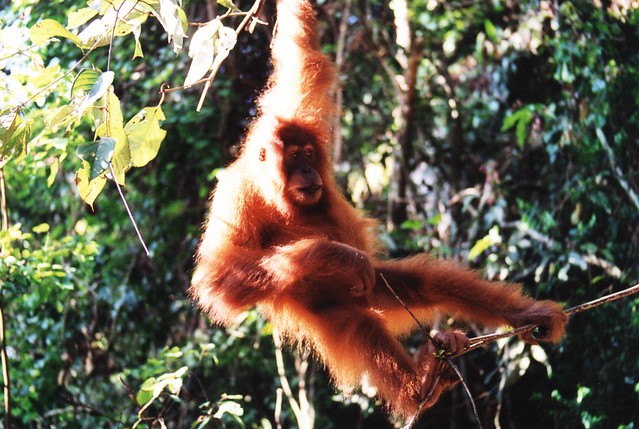[youtube=http://www.youtube.com/watch?v=odI7pQFyjso]
I think we have all heard of the problem of palm oil production and its impact on rain forests in South East Asia. Campaigns such as this one by Greenpeace have brought the effect of the increasing use of palm oil in industrial (food) products, namely the widespread deforestation of Indonesian rain forests, to the forefront of public discourse for a while, before it was dropped again in favor of another hot topic (the campaign video is from 2008; there was also a similar campaign against Kit Kat which is rather graphic). Basically, palm oil companies as well as mining companies are buying up Indonesian peatland and rain forest at an alarming rate in order to install monocropping plantations or mines, respectively, endangering one of the most biodiverse regions on Earth as well as the last remaining populations of wild Sumatran orangutans.
Now, Indonesia is in the headlines again for decisions regarding deforestation, and let me tell you – it’s complicated.
And if I say complicated, I mean it. Researching for this blog post, I went from “this is an issue!” to “oh, not an issue anymore” to “no, no, even bigger issue!”
Basically, this is what happened:
Two years ago, Norway and Indonesia entered a landmark agreement in which Norway agreed to pay Indonesia $1 billion for forest conservation. In return, Indonesia committed to suspending “all new concessions for conversion of peat and natural forest” for two years. Now, this agreement had its critics, and not few of them, but at least it was a start.
Now, positive news headlines report that Indonesia extended the logging ban to protect rainforests “despite fierce industry pressure”, ensuring that the moratorium would remain in its original form for at least another two years.
So all is good in Indonesian rain forests? Sadly, no.
While these bilateral negotiations were ongoing, one Indonesian province (Aceh) had its own separate negotiations with industry partners in order to, in their words, “give communities a small amount of forest to develop”. The head of the Aceh forestry department, Husaini Syamaun, said in a statement that the plan “was not aimed at the development of mines and plantations” and did not break any laws, while the regional government insisted it would only open up around 200,000 ha of new forest for exploitation.
NGOs, however, contend that figure and warn that this plan could free up as much as one million hectares of virgin rain forest to commercial exploitation. While officials argue that these roads would connect remote communities to the outside world, activists state that there are few buildings in the area and worry that these roads are just enabling access for big mining and palm oil companies.

Image by Nick Leonard, via Flickr CC.
Already building the planned roads would dissect a vital ecosystem (the Leuser ecosystem) and could endanger the continued survival of the few orangutan populations left. According to Ian Singleton, of the Sumatran Orangutan Conservation Programme, “genetic experts say you need 250 to 500 orangutans minimum to have a population that’s viable in the long term without too many bad inbreeding effects. We’ve only got about six of those [orang-utan] populations left, and every time you put a road through the middle of one, you effectively cut it in half.”
Aceh and North Sumatra are the last two provinces where Sumatran orangutans can be found in the wild, and the current population estimates are at around 6,000. These provinces are also where deforestation is particularly widespread: In North Sumatra, the amount of forest cover had decreased from 3.1 million hectares in 1985 to 1.6 million hectares in 2007, while in Rawa Tripa, Aceh, 75 percent of 62,000 hectares of forested area has already been converted into oil palm plantations.
This move is set to be approved by the Indonesian president despite his decision on the moratorium, since there exists a loophole: Aceh had, under the previous administration, enforced a logging ban that was stricter than the current national measure. Now, under a new government, the province is apparently free to overturn this ban – which would, according to them, not result in “new concessions” (which are prohibited by the moratorium) since those concessions would have previously been granted anyhow.
This highlights the great drawback and complication of trying to enforce conservation efforts in Indonesia: the country is so federalized and subdivided into provinces and districts that it is easy to circumvent one rule by just going a level down (or up). This problem was highlighted in a new report of the United Nations Development Programme, which exposed serious flaws in Indonesian forest governance. Their forest governance index, evaluating 117 indicators related to good governance of forest resources, showed stark contrasts between different provinces and districts; even overall, the country only scored 2.33 out of a possible 5 points on the index. The central government had the best score with 2.78 points.
But here is the crux of the matter: The province of Aceh, which we mentioned above, comes out as the province with the worst score (2.07 out of 5); even more alarming, on district level the average score was a 1.8. However, districts are where many of the final decisions on granting concessions and managing forests are made. Governors, district heads and mayors overall have authority over 85% of forest areas. One widespread issue is local government corruption, where officials are susceptible to bribes in exchange for commercial land permits. This evaluation thus shows again: forest management in Indonesia is complicated. Too complicated to save the orangutans?
P.S. If you would like to protest the move of the Indonesian government, there is an Avaaz petition running here.
‘While these bilateral negotiations were ongoing, one Indonesian province (Aceh) had its own separate negotiations with industry partners in order to, in their words, “give communities a small amount of forest to develop”. sends shivers down my spine…
Thanks for making the complicated issue more clear to me! Dreadful situation…